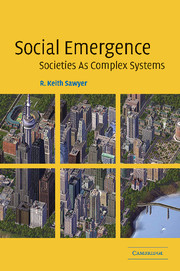Book contents
- Frontmatter
- Contents
- List of figures and tables
- Acknowledgments
- 1 Emergence, complexity, and social science
- 2 The third wave of social systems theory
- 3 The history of emergence
- 4 Emergence in psychology
- 5 Emergence in sociology
- 6 Durkheim's theory of social emergence
- 7 Emergence and elisionism
- 8 Simulating social emergence with artificial societies
- 9 Communication and improvisation
- 10 The Emergence Paradigm
- References
- Index
4 - Emergence in psychology
Published online by Cambridge University Press: 10 May 2010
- Frontmatter
- Contents
- List of figures and tables
- Acknowledgments
- 1 Emergence, complexity, and social science
- 2 The third wave of social systems theory
- 3 The history of emergence
- 4 Emergence in psychology
- 5 Emergence in sociology
- 6 Durkheim's theory of social emergence
- 7 Emergence and elisionism
- 8 Simulating social emergence with artificial societies
- 9 Communication and improvisation
- 10 The Emergence Paradigm
- References
- Index
Summary
First, sociology is a type of knowledge worthy of study in its own right, especially with regard to its relations (of difference as well as similarity) with psychological knowledge. Second, the very object of sociological knowledge is of vital interest to epistemology, since human knowledge is essentially collective.
Jean PiagetIn Chapter 3, I traced the long history of emergentist thought in the social sciences, from its nineteenth-century origins to the mid-twentieth century. This history demonstrates that emergentism has always been an influential element in the foundational theories of both psychology and sociology. In this chapter, I bring the story up to the present by reviewing emergentist elements in contemporary psychology. In the bulk of the chapter, I identify five unresolved issues that emergentism has encountered throughout its history, and I suggest several implications for contemporary schools of psychology. Most of these issues are essentially sociological, and this discussion leads into the more sociological material of Chapters 5 through 7.
Emergence is a central concept in two contemporary psychological paradigms – socioculturalism and connectionist cognitive science – and both of them have important implications for sociology. The connectionist and distributed models of contemporary cognitive science hypothesize a “society of mind” (Minsky 1985; Rumelhart and McClelland 1986); that is, they consider the mind to be a society of independent, autonomous entities, with mental states emerging from their interaction.
- Type
- Chapter
- Information
- Social EmergenceSocieties As Complex Systems, pp. 46 - 62Publisher: Cambridge University PressPrint publication year: 2005



